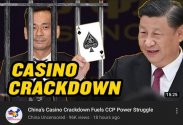In a nutshell: ending the Korean War is a non-starter for the United States for a whole variety of reasons, so what will Biden do? Very simply, he’ll wait until Moon is out of office.
The US will never accept a formal end to the Korean War because maintaining the status quo remains firmly in its geopolitical interests. The ‘frozen conflict’ is ultimately what allows Washington to host 30,000 troops on the Korean peninsula in the effort to contain North Korea, sustain operational command over South Korea’s entire army and control the border via the United Nations Command. South Korea is a pillar of its military projection in Asia, with China firmly in view.
To end the Korean War would immediately negate the purpose and legitimacy of America’s presence, culling the idea of its ‘saviour narrative’ and empowering suppressed political movements who want the US to leave (both in South and North Korea).
As a result, Moon Jae-in is effectively left as a middle man attempting to get others to come to agreement. He may talk of peace and attempt to facilitate dialogue, but the role of the US means that Moon has no sovereignty to proclaim the end to a war his country is part of. America doesn’t reconsider its global dominance on ‘good intentions’ and ultimately that’s all Moon has here. The Biden administration does not consider North Korea as a priority issue due to its focus on China, and to a lesser extent Russia.
In addition, the continued existence of a hostile North Korea continues to act as a legitimating factor to push for the rearmament of Japan in the pursuit of Beijing, as well as to move other assets into the region. China, in turn, is another advocate of ending the war precisely for this reason, but would be vehemently opposed to any outcome which sees North Korea capitulate and fall into the US sphere of influence.
Given all these considerations, the stalemate will continue and if the Conservative hardliner Yoon Suk-yeol is victorious in the South Korean election next March, you can forget about peace altogether. He is likely to pivot the country into an anti-North Korea and anti-China position, a new dynamic which will sidestep Moon’s desire to escape the US-China conflict – and entrench all the differences more firmly than ever.
[…]

